

The World of 100 : Toby Ng Design. This Protein Could Change Biotech Forever. Clinical & Translational Science Awards Portal. Page 3 - Biotech Stock Mailbag: Research Backs Shorting Micro-Cap Cancer Drug Stocks. The list of companies with negative phase III trial results -- and falling stock prices prior to announcement of those results -- included Cell Genesys, Novacea, Aeterna Zentaris (AEZS_), Vion Pharmaceuticals, Vical (VICL_) and more.
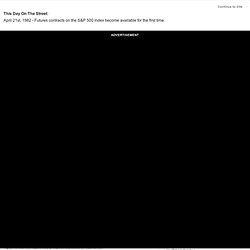
[No surprise: Many of the these companies are no longer in business.] Detsky and his co-authors deserve credit for raising the issue of insider trading as it relates to the conduct of clinical trials, but trying to prove that point by looking only at stock trading demonstrates a real lack of understanding about how Wall Street operates. Instead, what Ratain and I demonstrate with our analysis is that the markets do a pretty decent job of using publicly available information to separate out the winners from the losers well before phase III clinical trial results are announced.
For investors looking ahead at ongoing cancer drug studies, our conclusion offers some potentially valuable advice: Winners And Losers From The Zaltrap Price Discount: Unintended Consequences? Soon after Sanofi Pharmaceuticals’ Inc.
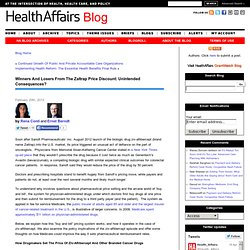
August 2012 launch of the biologic drug ziv-aflibercept (brand name Zaltrap) into the U.S. market, its price triggered an unusual act of defiance on the part of oncologists. Physicians from Memorial Sloan-Kettering Cancer Center stated in a New York Times op-ed piece that they wouldn’t prescribe the drug because it cost twice as much as Genentech’s Avastin (bevacizumab), a competing biologic drug with similar expected clinical outcomes for colorectal cancer patients.
In response, Sanofi said they would reduce the price of the drug by 50 percent. Doctors and prescribing hospitals stand to benefit hugely from Sanofi’s pricing move, while payers and patients do not, at least over the next several months and likely much longer. Meet the 14 New Rock Health Startups Innovating in Digital Health. San Francisco’s Rock Health startup accelerator held its fourth semi-annual Demo Day at UCSF’s Genentech Hall Wednesday afternoon.
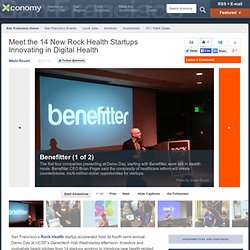
Investors and journalists heard pitches from 14 startups working to introduce new health-related services for consumers and new ways to improve the efficiency of the U.S. healthcare system. On the consumer side, one intriguing presenter was Beam Technologies, which is building a toothbrush embedded with motion sensors to detect how long a person has been brushing. A Bluetooth radio sends the data to a smartphone app. (Perhaps it should have been called the Bluetoothbrush.)
At the opposite extreme, aiming to introduce software-based improvements that will lower overall healthcare costs, were companies like Eligible, which is building software connectors to make it easier for hospitals to check patients’ insurance eligibility, and CliniCast, which wants to assign patients FICO-like risk scores to help healthcare providers decide how to allocate care.
Sage Bionetworks Absorbs Dream, Plans Open Science ‘Challenges’ Luke Timmerman2/19/13 Sage Bionetworks is a nonprofit, so it isn’t in the business of doing mergers and acquisitions in the traditional sense.
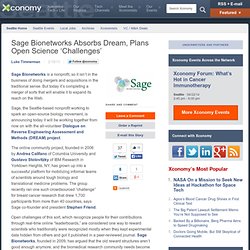
But today it’s completing a merger of sorts that will enable it to expand its reach on the Web. Sage, the Seattle-based nonprofit working to spark an open-source biology movement, is announcing today it will be working together from now on with the all-volunteer Dialogue on Reverse Engineering Assessment and Methods (DREAM) project. The online community project, founded in 2006 by Andrea Califano of Columbia University and Gustavo Stolovitzky of IBM Research in Yorktown Heights, NY, has grown up into a successful platform for mobilizing informal teams of scientists around tough biology and translational medicine problems. The group recently ran one such crowdsourced “challenge” for breast cancer research that drew 1,700 participants from more than 40 countries, says Sage co-founder and president Stephen Friend.
Stephen Friend. Databases. Collected here are some of the most commonly used tools and services for business development professionals to identify in-licensing opportunities, locate potential partners, find competitor intelligence and help guide deal terms.
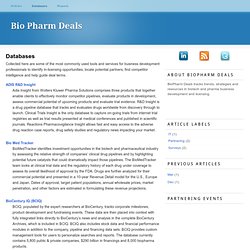
ADIS R&D Insight Adis Insight from Wolters Kluwer Pharma Solutions comprises three products that together enable clients to effectively monitor competitor pipelines, evaluate products in development, assess commercial potential of upcoming products and evaluate trial evidence. R&D Insight is a drug pipeline database that tracks and evaluates drugs worldwide from discovery through to launch. Clinical Trials Insight is the only database to capture on-going trials from internet trial registries as well as trial results presented at medical conferences and published in scientific journals. Reactions Pharmacovigilance Insight allows fast and easy access to the adverse drug reaction case reports, drug safety studies and regulatory news impacting your market.
The Cancer Imaging Archive - About The Cancer Imaging Archive (TCIA) What is TCIA? A large archive of medical images of cancer accessible for public download. Registering is free. All images are stored in DICOM file format. The images are organized as "Collections", typically patients related by a common disease (e.g. lung cancer), image modality (MRI, CT, etc) or research focus. What value would it be to me? A huge amount of clinical and research images are collected each year. Curing Brain Cancer Through Crowdsourcing. 10 people who led us to the ‘fiscal cliff’ - Rex Nutting.